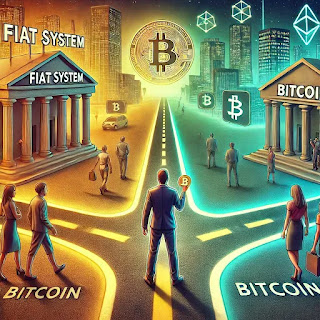Why Fiat Always Ends in Ruin
What do Roman emperors, Chinese dynasties, and modern central banks have in common? They all thought they could outsmart the laws of money. And every single time, they were wrong.
Fiat currency, the kind backed by nothing but government decree, has a perfect track record. A record of failure. From the ancient denarius to today’s dollar, history shows us one truth: when money is no longer scarce, it becomes worthless. Every time a government has chosen fiat, it has ended in collapse, chaos, and economic ruin. No exceptions. Ever.
Let’s go back. Ancient Rome began with silver coins. Real value. But emperors couldn’t resist the temptation to fund wars and bread circuses by cutting the silver content. Over time, the denarius became a hollow shell, worthless in all but name. The empire followed soon after. By the time Rome fell, the currency had lost the trust of its people, and the economy had devolved into barter. What was once a thriving superpower had been gutted from within by monetary manipulation.
China’s Yuan Dynasty tried paper money first. A groundbreaking innovation, until it wasn’t. They printed more and more, devaluing their own currency until confidence collapsed. The dynasty fell into disarray. In later dynasties, the same pattern repeated: initial stability followed by excess, inflation, and societal disruption. Trust in money was replaced by desperation for goods. People fled back to bartering or hoarding hard assets like silver and grain.
Fast forward to Weimar Germany. After World War I, crushed by reparations and economic mismanagement, the German government printed its way into hyperinflation. Wheelbarrows of cash couldn’t buy a loaf of bread. Middle-class savings evaporated. Civil unrest surged. The chaos laid the groundwork for radical political movements because when money breaks, society follows.
Zimbabwe. Venezuela. Lebanon. Argentina. Different continents. Different decades. Same outcome. Once a government decouples its money from real value and begins printing without restraint, collapse is only a matter of time. Always.
Fiat fails because it’s not money, it’s a political tool. It’s a way to shift wealth silently. A mechanism of control. And because it’s so easy to manipulate, it always gets abused. Politicians promise more than they can fund. Wars need financing. Votes need buying. Bailouts need money. Central banks step in, spinning new currency out of thin air to make it happen. And the more they print, the more purchasing power you lose.
The result? Your savings lose value. Your wages buy less. Asset prices soar. And the real economy gets hollowed out in favor of financial games and speculative bubbles. Sound familiar? It should. Because we’re living through the late stages of another great debasement. The U.S. dollar has lost over 90% of its purchasing power in the last century. Today, most people can’t buy a home, can’t save for retirement, and live paycheck to paycheck, despite working harder and longer than ever before.
The illusion of control is what keeps this scam alive. Central planners tweak interest rates, massage CPI numbers, and gaslight the public with financial jargon. “Inflation is good,” they say. “We’re targeting 2%,” they repeat. But they never tell you that 2% inflation means your money halves in value every 35 years. And we all know it's rarely just 2%. They quietly redefine the metrics to hide the truth, while your quality of life deteriorates.
Every fiat collapse begins with the lie: this time is different. Spoiler alert, it never is.
But for the first time in history, we have a way out. A currency with no king, no emperor, no central planner. Bitcoin is the antidote to fiat rot. With a hard cap of 21 million coins, it’s immune to inflation. It’s global. Transparent. Unstoppable. It rewards saving, not spending. Patience, not panic. It gives power back to individuals and communities instead of bureaucrats and billionaires.
Bitcoin doesn’t just represent better money. It represents the end of this cycle. The end of trusting corrupt institutions to manage value on our behalf. It’s a reset, one we can choose. Unlike fiat, Bitcoin has no incentive to lie. It doesn’t fund wars. It doesn’t bail out bad decisions. It operates with mathematical certainty and zero bias. It’s money without masters.
Fiat will fail again. It’s already failing. The only difference this time is that we have an escape hatch. The door is open, but you have to walk through it. The system will not fix itself. It was never designed to. It was designed to transfer wealth from the many to the few, and it’s done that job spectacularly well.
History has taught us this lesson a thousand times. But lessons don’t matter unless we act on them. Bitcoin is our chance to finally learn, evolve, and build a future that’s not chained to lies.
Tick tock. Next block.




Comments
Post a Comment